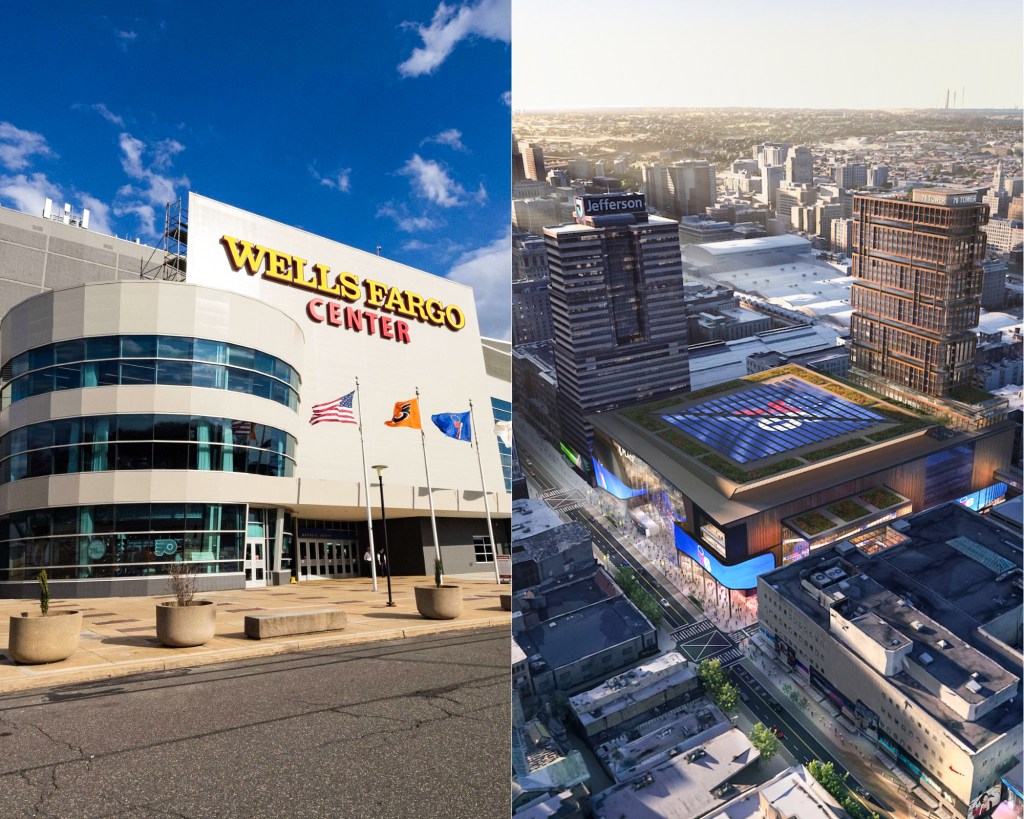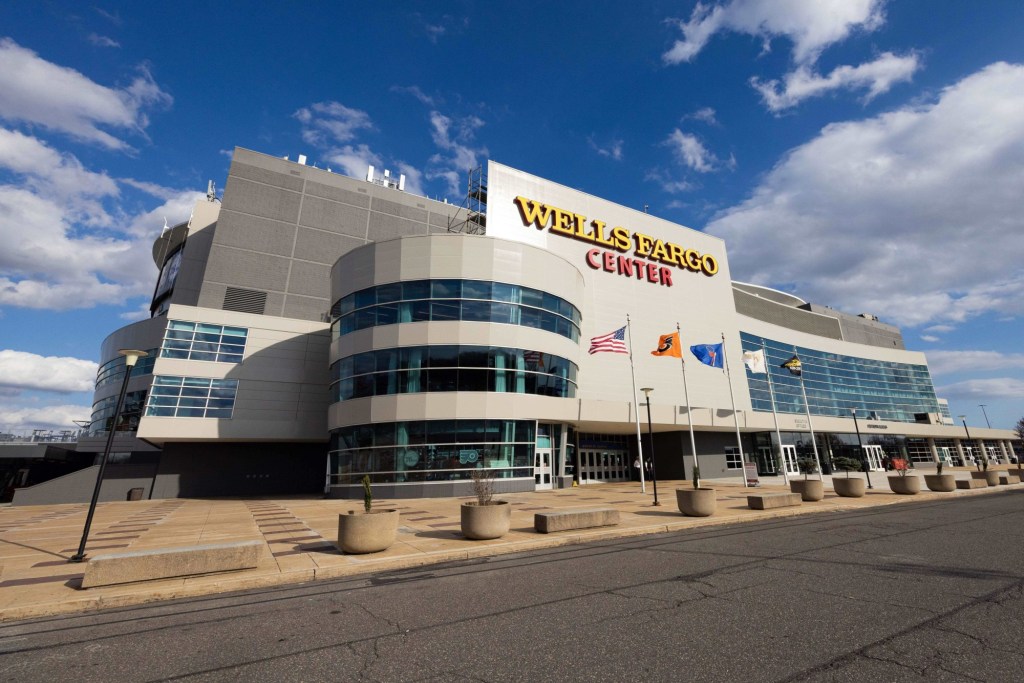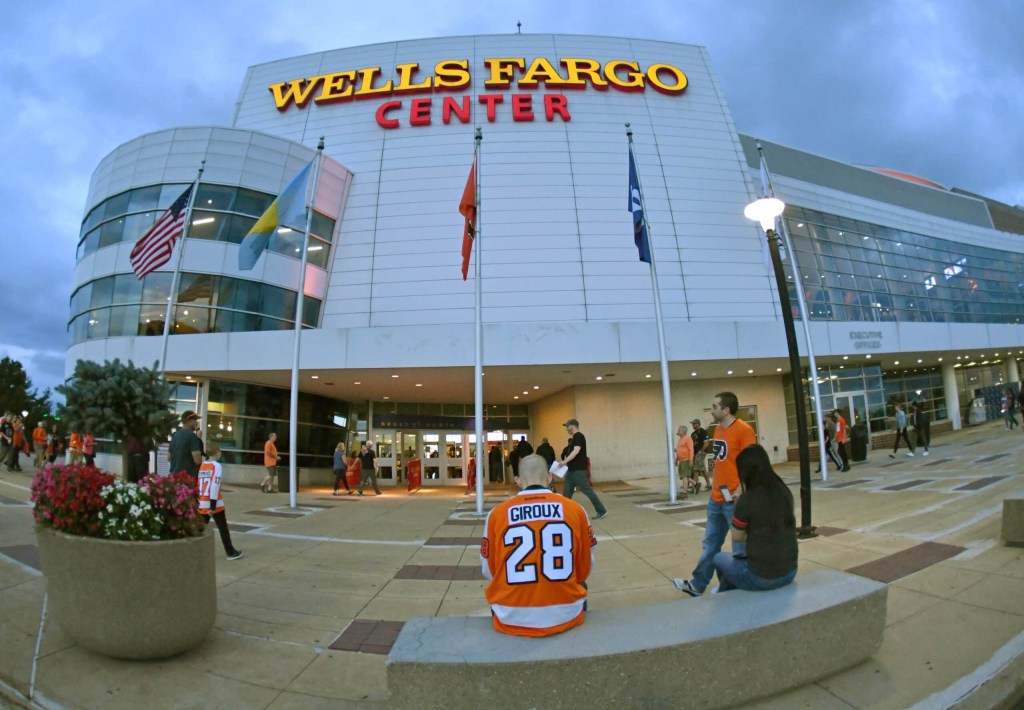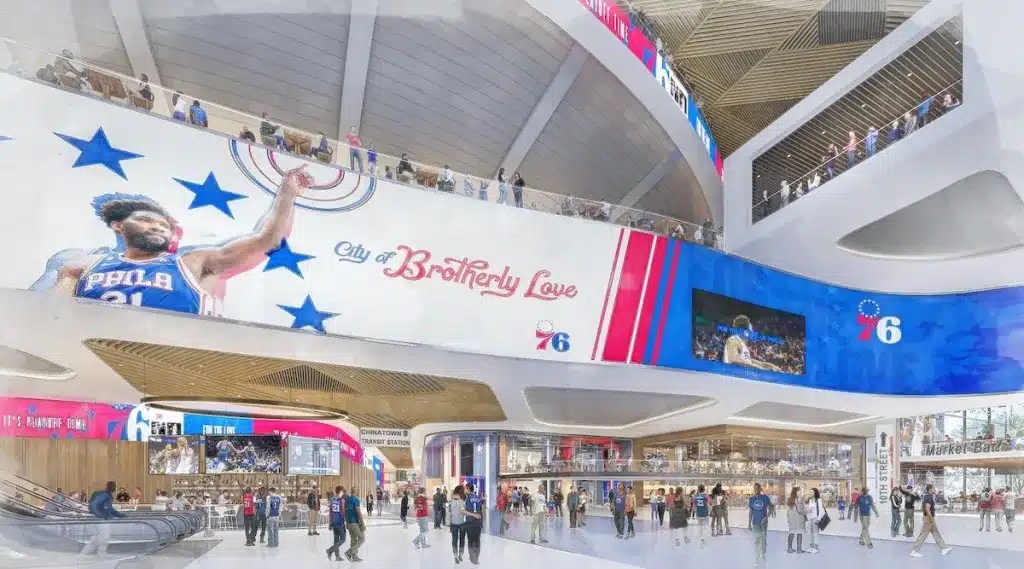Philadelphia is known as the City of Brotherly Love, but there’s not a lot of it right now between the parent organizations of the Philadelphia 76ers and Flyers.
Harris Blitzer Sports & Entertainment, the 76ers’ parent, has embarked on a dramatic bid to a build a $1.55 billion, privately financed arena in downtown Philadelphia, a project that simultaneously seeks to give the team its own venue for the first time in franchise history and improve a downtrodden area of Center City.
Comcast Spectacor, the Flyers’ parent, as well as owner of the Wells Fargo Center and local sports arm of telecom giant Comcast, is in the final stages of $400 million in upgrades to the facility — both teams’ home since its 1996 opening — and is actively seeking to keep the 76ers with the Flyers in what it calls a “transformed” venue.
Those fundamental differences in vision for Philadelphia’s arena future ran hot this past summer. Harris Blitzer partner David Adelman called the Wells Fargo Center work merely “cosmetic” in nature, and Comcast Spectacor responded by accusing Adelman and Harris Blitzer of spreading “mistruths and distortions.”
Since then, both organizations have assumed a calmer tone, at least publicly. But the arena debate carries major implications for the country’s fourth-largest media market that involve a variety of business and political subplots. The issue also spills out into the broader live sports and entertainment business given the 76ers’ intent to build a next-generation venue to open in 2031, when its lease for the Wells Fargo Center expires, with state-of-the-art amenities and perhaps an entirely new design concept.
“We are looking forward to being able to control our own destiny and how we’re going to grow as an organization,” Tad Brown, Harris Blitzer CEO, told Front Office Sports. “We’re the only [major pro] team in the commonwealth [of Pennsylvania] that doesn’t have its own facility. So I don’t think it’s a unique concept of us wanting to control every aspect of our fans’ experience and that of our players, coaches, and employees. This is something we’re pursuing, and it’s going to happen.”
Not so fast, says Comcast Spectator. The company is proposing a 50-50 partnership with Harris Blitzer on the ownership and operation of Wells Fargo Center — and the same split on a potential new venue located in the South Philadelphia sports complex.
“We think we can cover a lot of their needs, do something really special, and double down on attracting more acts to South Philadelphia,” Dan Hilferty, Comcast Spectacor chair and CEO, told FOS. “It is their right to go explore their options, but we want this to be such an enticing option for them that they’ll seriously consider it.”
Location, Location, Location
The current South Philadelphia sports complex is unrivaled in the U.S. for its concentration of major sports and entertainment facilities, with the Wells Fargo Center, Philadelphia Phillies’ Citizens Bank Park, and Philadelphia Eagles’ Lincoln Financial Field all sharing one set of parking lots and offering easy access to the Walt Whitman Bridge for fans in neighboring southern New Jersey, as well as a stop on the city’s SEPTA transit system.
Comcast Spectacor’s ongoing work in and around Wells Fargo Center, also privately financed and boosted by a recent marketing campaign, is now looking to extend to a proposed mixed-use development adjacent to the arena that would include residential and retail elements, as well as a roughly 6,000-seat venue for smaller events.
Those efforts have developed for several years without any major local pushback given that the area has already been a hub for live sports and entertainment for 55 years, going back to the old Veterans Stadium and Spectrum.
The situation contrasts significantly from the early tenor surrounding the 76ers’ arena proposal, which aims to bring the team in line with 28 of 29 other NBA teams that currently play in downtown venues. That project has already encountered significant opposition from within Philadelphia’s Chinatown, where fears persist of the arena destroying the cultural hub. Some community polls have run as high as 90% against the effort, and tensions again ran high at the most recent public meeting on the proposed arena.
City councilman Mark Squilla told the Philadelphia Inquirer, “I never got lobbied more by two sides on anything. My meetings have tripled since this was announced.”
Brown says the dialogue with the local community remains in its early stages.
“This is incredibly important, and it’s ongoing,” Brown said. “We are very encouraged that the Asian American Chamber [of Commerce of Greater Philadelphia] has come forward to open a dialogue with us so that we can have a much more clear process for understanding how we can work with the business community in Chinatown.”
Part of Harris Blitzer’s argument has also been to promote the potential economic benefits of a new arena. The organization recently touted more than $450 million in new net tax benefits to Pennsylvania. The official Wells Fargo Center account on X, however, quickly blasted that claim as a “myth.”
Hilferty argues that the community needs in Center City Philadelphia can’t wait until a 2031 opening of a new arena. “This is really about the neighborhoods. Anything we do [in the sports complex] we’re going to get community neighborhood buy-in,” he said.
“The Sixers — when you look at Market East, Chinatown, other surrounding communities — they have a say in what’s going to happen. The needs there are immediate.”
Booking Battle
While the teams and their parent organizations are at the center of this battle, concerts and other non-sports events are critical factors.
Comcast Spectacor says the market for those events is already well served by Wells Fargo Center, adding that only two potential shows in the last eight years failed to be booked there due to calendar conflicts.
The company also argues that its ability to book and stage shows for Wells Fargo Center is now enhanced by the multiyear run of facility improvements, both consumer-facing and not, including new video boards, improved seating, a series of upgraded club and gathering spaces, and a remade service and event level. Ultimately, it considers the venue much more akin to a new facility than a 27-year-old one.
“When I walk around here, I remain blown away by what’s been done here and what the potential still is,” Hilferty said. “We’re here to make this the premier sports and entertainment district in the nation, and you can’t do that without maximizing revenue potential and experience potential. We’re at a point now where that’s being questioned, so we want to be emphatic about our commitment to it.”
Music industry titan Irving Azoff, however, recently wrote Hilferty after an unsuccessful bid to book classic rock veterans the Eagles in Philadelphia, saying that, “I do not believe my experience trying to recently book a major concert at the Wells Fargo Center and, more importantly, the insight I’ve gained over the last 50 years that tells me a city like Philadelphia can handle two arenas, should be mischaracterized as a ‘myth.’”
Brown concurred, and said the issue for him largely boils down to a desire by Comcast Spectacor to retain much of the control it’s enjoyed for decades.
“I understand if people have a difference of opinion, and only want to have one [arena] for concerts and sporting events to happen. I don’t agree with it,” Brown said. “I understand the philosophical argument that it’s best for a certain group’s business or best for the historical experience. That doesn’t mean it’s in the best interest of the city, our team, or our fan base.”
However the battle between Comcast Spectacor and Harris Blitzer ends, the arena situation promises to make Philadelphia’s future as much of an attraction as the city’s celebrated past.






